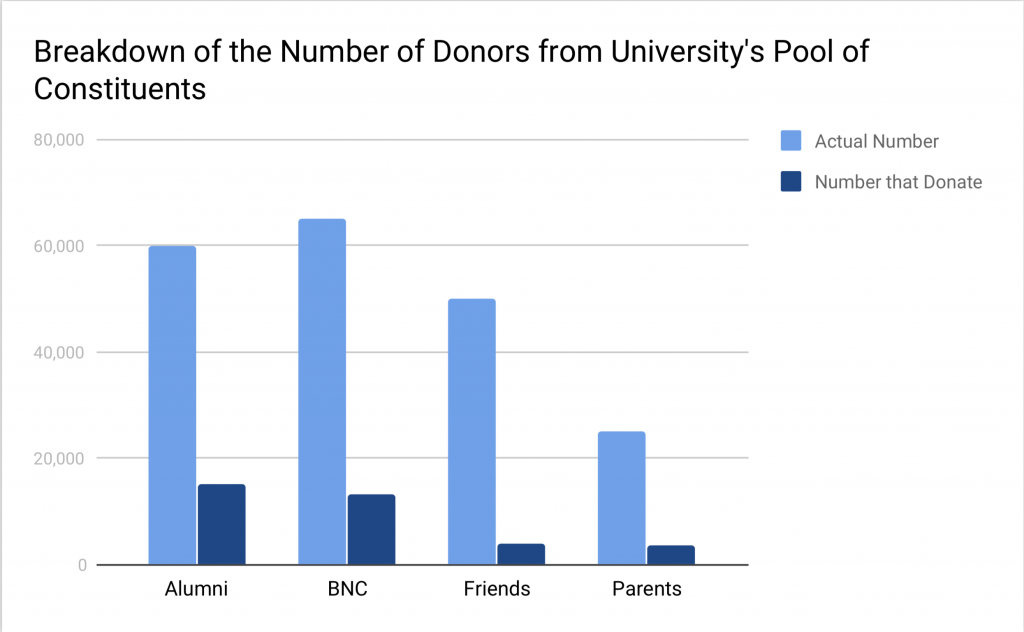Senior Vice President of Institutional Advancement Zamira Korff is leading a new campaign for university fundraising to foster new generations of support for Brandeis’ budget. In the most recent faculty senate meeting on Nov. 1, Korff proposed that the university switch its targeted audience to alumni, international relations—potential donors from abroad—and the next generation rather than being dependent on trustees for donations, as Brandeis has been in the past.
The university has a legacy of dependency on trustees, said Korff, which has been great, but has also become too much of a safety net.
“From the start to really to today, we had such a heavy reliance on our founder’s friends and trustees that we failed to explore new opportunities, and we failed to engage our alumni,” said Korff in the faculty meeting.
Korff crafted a three-part plan which arranges the steps the university should take to foster a new generation of support. The first step is connecting with untapped cohorts and networks, said Korff, which includes the university’s international relations, women and the next generation of alumni.
The university has tried connecting with these groups through events like the Women’s Leadership Network Program and programs which are expanding in the United Kingdom and China to reach out to international groups. The university is looking to expand on the momentum these groups have created in other locations, Korff said in an interview with The Brandeis Hoot.
The next part of Korff’s plan is to engage the new generation and philanthropists who are inspired by the university’s distinct strengths, Korff said.
“People in this political environment in this world more than ever are so focused on what essentially is the ethos of Brandeis. They think about how one does justice and scientific research and how those things come together,” said Korff.
The final part is to leverage the demographics of the university’s alumni base which provides the potential to attract and build up a more traditional base of supporters, said Korff. The university has to move away from our unique means of fundraising through trustees and move toward a more sustainable, traditional model of fundraising by using our alumni resources.
Brandeis has over 200,000 constituents—a word Korff used to describe potential donors, which can be broken down into 60,000 alumni; 65,000 people affiliated with the Brandeis National Committee (BNC) (a group that was founded the same year as the university to provide financial support for Brandeis and its libraries); 50,000 friends and 25,000 parents.
Out of the 200,000 consitutients, 36,150, or about 18 percent, end up donating to the university. That includes 15,300 alumni, 13,150 BNC affiliates, 4,000 friends and 3,700 parents. There’s a lot of opportunity in that framework, said Korff, because not all 200,000 prospects will become donors, but there is always opportunity to gain more.

“The essence of fundraising is not actually about the money; it’s about what the money is going to enable us to do,” said Korff.
Faculty members are critically important to fundraising, said Korff, because they help convey the essence of the university to funders and investors. Korff wants the Institutional Advancement division to partner with faculty to further collaborate with programs such as “Faculty in the Field,” a program which has faculty routinely speak on behalf of the university at local, national and international events to engage donors and highlight the work of the university.
The university’s last fundraising peak was in 2011, according to Korff. Following the economic crisis, the university took a plunge with fundraising money.
In the post-economic crisis period nation-wide, giving to research universities increased by 34 percent, while giving to Brandeis had decreased by 19 percent. Since 2011, the university has not invested in another fundraising campaign until this plan.
“This [data] shows that our pipeline dried up overtime, and we didn’t rekindle our investment in new donors, which is what we are focusing to do right now,” said Korff.
Korff wants the university’s funds to be replenished through the engagement of donors in long term, sustainable support with meaningful relations as opposed to our current short-term interactions due to a need for “short-term dollars.”


